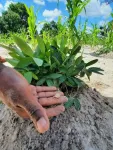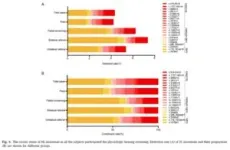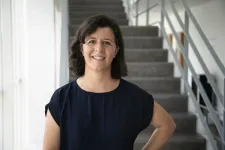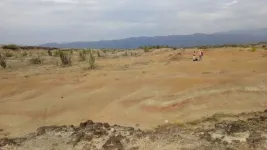(Press-News.org) Viewed globally, it is above all individuals and households that are pursuing adaptation to the impacts of climate change; systematic networking of the various groups affected is lacking. This is the conclusion reached by an international team of experts from Universität Hamburg’s Cluster of Excellence for climate research (CLICCS) and Ludwig-Maximilians-Universität München (LMU). Their meta-study was just released in the journal Nature Climate Change.
For their meta-study, the 30 authors analyzed more than 1,400 academic studies on climate change adaptation. By doing so, they offer the first global overview of which groups of actors are pursuing adaptation – and how. Their findings show that the global distribution of tasks lacks cohesion. Above all, there are few concepts designed to better prepare societies, infrastructures and risk management for the impacts of climate change. Extensive collaborations between various government and non-government actors are also lacking.
“Our study indicates that climate change adaptation continues to be largely isolated and uncoordinated,” says Dr. Kerstin Jantke, a co-author and environmental researcher at Universität Hamburg’s Cluster of Excellence CLICCS. “That’s disproportionate to how pressing and vital this challenge is.”
Dr. Jan Petzold, the study’s first author, sees a need for action: “Comprehensive, just and forward-thinking adaptation can be considered to be successful when not only official organizations but also a broad range of groups at all levels are involved.” Petzold, currently a geographer at Ludwig-Maximilians-Universität München, was a member of the Cluster of Excellence CLICCS until the fall of 2021.
To date, primarily individuals and households are taking measures to adapt to climate change impacts, especially in the Global South; very few of them are integrated into institutional frameworks. However, there is also an urban-rural divide: While individual households are largely active in rural areas, government actors tend to coordinate adaptation in cities. In many cases, the role of governments – global, national and regional – consists in ratifying, planning and financing adaptation measures, while small households are who do most of the technical implementation. According to the study, the scientific community’s involvement in adaptation measures is limited, while that of the private economy is virtually non-existent.
“If, around the globe, it’s predominantly individuals like farmers and smallholders who are doing the heavy lifting, it also shows us the lack of cooperation between different groups of actors – which is a prerequisite for sustainable adaptation projects,” says Jan Petzold. Coordinated concepts are indispensable for far-reaching measures like the climate-aware restructuring of forests, transforming farmland into floodplains, planning new urban infrastructures, and relocating coastal communities.
Involving different groups of actors can also help avoid undesired effects of adaptation measures. “If I only design a given measure to address a single, pressing problem, it could make the situation worse in other areas,” says Kerstin Jantke. For example, levees and dams designed to protect from flooding could destroy coastlines and wetlands, reducing biodiversity or natural CO2 sinks. Consequently, comprehensive measures should ideally be oriented on the United Nations’ Sustainable Development Goals (SDGs), helping ensure it offers solutions that are tenable in the long term.
Publication
Petzold J, Hawxwell T, Jantke K, Gonçalves Gresse E, Mirbach C, (…) Garschagen M (2023): A global assessment of actors and their roles in climate change adaptation; Nature Climate Change; DOI: 10.1038/s41558-023-01824-z
https://www.nature.com/articles/s41558-023-01824-z
https://www.cliccs.uni-hamburg.de/about-cliccs/news/2023-news/2023-09-20-anpassungen-klimawandelfolgen
The 30 authors contributing to the study hail from eleven different countries. Eight authors are researchers at Universität Hamburg’s Cluster of Excellence for climate research (CLICCS).
Contact
Dr. Kerstin Jantke
Universität Hamburg
Center for Earth System Research and Sustainability (CEN)
Cluster of Excellence “Climate, Climatic Change, and Society” (CLICCS)
Email: kerstin.jantke@uni-hamburg.de
Tel: +49 (0) 40 42838 2147
Dr. Jan Petzold
Department für Geographie
Ludwig-Maximilians-Universität München
E-Mail: jan.petzold@lmu.de
Tel.: +49 (0) 89 / 2180 - 4180
Stephanie Janssen
Public Relations / Outreach
Universität Hamburg
Center for Earth System Research and Sustainability (CEN)
Cluster of Excellence “Climate, Climatic Change, and Society” (CLICCS)
Email: stephanie.janssen@uni-hamburg.de
Tel: +49 (0) 40 42838 7596
END
Around the globe, climate adaptation lacks coordination
How are governments, organizations and individuals dealing with the effects of global warming?
2023-10-12
ELSE PRESS RELEASES FROM THIS DATE:
Red blood cell transfusion in the ICU
2023-10-12
About The Study: Red blood cell (RBC) transfusion was common in patients admitted to 233 intensive care units in 30 countries between 2019 and 2022, with high variability across centers in transfusion practices. Although many different clinical reasons and triggers were stated for RBC transfusion, the three most common reasons (low hemoglobin level, active bleeding, hemodynamic instability) and triggers (hypotension, tachycardia, no physiological trigger affected the decision to transfuse) were largely overlapping in all regions.
Authors: Alexander P. J. Vlaar, M.D., Ph.D., M.B.A., of Amsterdam University Medical ...
Small-volume blood collection tubes to reduce transfusions in intensive care
2023-10-12
About The Study: This randomized trial in 25 adult medical-surgical intensive care units (ICUs) in Canada found that the transition from standard-volume to small-volume tubes for blood collection in the ICU may reduce red blood cell transfusion without impacting biospecimen sufficiency for laboratory analysis.
Authors: Deborah M. Siegal, M.D., M.Sc., of McMaster University in Hamilton, Ontario, Canada, is the corresponding author.
To access the embargoed study: Visit our For The Media website at this link https://media.jamanetwork.com/
(doi:10.1001/jama.2023.20820)
Editor’s Note: Please see the article for ...
The burden of lung cancer in women compared with men in the US
2023-10-12
About The Study: Based on high-quality population-based data, this study found that the higher lung cancer incidence in women than in men has not only continued in individuals younger than 50 years but also now extends to middle-aged adults as younger women with a high risk of the disease enter older age. Reasons for this shift are unclear because the prevalence and intensity of smoking are not higher in younger women compared with men except for a slightly elevated prevalence among those born in the 1960s.
Authors: Ahmedin Jemal, D.V.M., Ph.D., of the American Cancer Society in Atlanta, is the corresponding author.
To access the embargoed study: ...
Race and ethnicity and primary language in emergency department triage
2023-10-12
About The Study: In this study of 249,000 visits to seven academic and community hospital emergency departments, patients who identified as Black, Hispanic, and Other race and ethnicity were assigned less acute Emergency Severity Index scores than their white peers despite having received more involved physician workups, suggesting some degree of mistriage. Clinical decision support systems might reduce these disparities but would require careful calibration to avoid replicating bias.
Authors: Joshua W. Joseph, M.D., M.S., ...
Big blood savings: large trial in JAMA shows taking less blood for lab testing reduces transfusions in intensive care
2023-10-12
A world-first clinical trial published in JAMA could provide an easy way to save tens of thousands of units of blood every year in Canada and much more worldwide. The trial, which involved more than 27,000 patients in 25 adult intensive care units (ICUs) across Canada, showed that taking less blood for lab tests using “small-volume” tubes reduced the need for almost one blood transfusion for every 10 patients.
Most hospitals use standard tubes that automatically draw four to six milliliters (ml) of blood, but a typical laboratory test requires less than 0.5 ml of blood, meaning the rest (more ...
We can respond to verbal stimuli while sleeping
2023-10-12
Sleep is generally defined as a period during which the body and mind are at rest—as if disconnected from the world. However, a new study led by Delphine Oudiette, Isabelle Arnulf, and Lionel Naccache at Paris Brain Institute shows that the frontier between wakefulness and sleep is much more porous than it seems.
The researchers have shown that ordinary sleepers can pick up verbal information transmitted by a human voice and respond to it by contracting their facial muscles. This astonishing ability occurs intermittently during almost all stages of sleep—like windows of connection with the outside world were temporarily opened on this occasion.
These new findings ...
Flagship individuals can boost conservation
2023-10-12
“Flagship” individual animals like Cecil the lion or Freya the walrus can boost conservation, new research suggests.
Much-loved species like pandas and polar bears are widely used in conservation campaigns.
However, a new study argues that individual animals or plants can also be used as flagships, with enormous potential to raise awareness and mobilise public support.
The recent outcry over the felling of the “Sycamore Gap” tree in the UK demonstrates the power of individual plants or animals in public opinion.
“Flagship individuals typically share some common characteristics,” ...
Letting go of an extra weight to control sleeping sickness
2023-10-12
Letting go of an extra weight to control sleeping sickness
A new study led by Luísa Figueiredo, group leader at the Instituto de Medicina Molecular João Lobo Antunes (iMM; Portugal), and published today in the scientific journal Nature Microbiology* found a new strategy by the host to cope with Trypanosoma brucei infection. Trypanosoma brucei is the parasite that causes sleeping sickness in humans, and nagana in cattle, which remain a public health ...
Simulations of ‘backwards time travel’ can improve scientific experiments
2023-10-12
Physicists have shown that simulating models of hypothetical time travel can solve experimental problems that appear impossible to solve using standard physics.
If gamblers, investors and quantum experimentalists could bend the arrow of time, their advantage would be significantly higher, leading to significantly better outcomes.
Researchers at the University of Cambridge have shown that by manipulating entanglement – a feature of quantum theory that causes particles to be intrinsically linked – they can simulate what could happen if one could travel backwards in time. So that gamblers, investors and ...
Extraordinary fossil find reveals details about the weight and diet of extinct saber-toothed marsupial
2023-10-12
Recent paleontological explorations in the Tatacoa Desert in Colombia led to the recovery of the most complete skeleton of a "saber-toothed marsupial” discovered in northern South America. The specimen belongs to the species Anachlysictis gracilis, which is part of a group of extinct predatory mammals known as sparassodonts, that lived in South America during the Cenozoic, after the extinction of the dinosaurs.
This species lived approximately 13 million years ago in the area known among paleontologists as ‘La Venta’, in the current La Tatacoa desert, a tropical dry forest that “at that time was a tropical rainforest, similar to the current Amazon,” said ...
LAST 30 PRESS RELEASES:
$3 million NIH grant funds national study of Medicare Advantage’s benefit expansion into social supports
Amplified Sciences achieves CAP accreditation for cutting-edge diagnostic lab
Fred Hutch announces 12 recipients of the annual Harold M. Weintraub Graduate Student Award
Native forest litter helps rebuild soil life in post-mining landscapes
Mountain soils in arid regions may emit more greenhouse gas as climate shifts, new study finds
Pairing biochar with other soil amendments could unlock stronger gains in soil health
Why do we get a skip in our step when we’re happy? Thank dopamine
UC Irvine scientists uncover cellular mechanism behind muscle repair
Platform to map living brain noninvasively takes next big step
Stress-testing the Cascadia Subduction Zone reveals variability that could impact how earthquakes spread
We may be underestimating the true carbon cost of northern wildfires
Blood test predicts which bladder cancer patients may safely skip surgery
Kennesaw State's Vijay Anand honored as National Academy of Inventors Senior Member
Recovery from whaling reveals the role of age in Humpback reproduction
Can the canny tick help prevent disease like MS and cancer?
Newcomer children show lower rates of emergency department use for non‑urgent conditions, study finds
Cognitive and neuropsychiatric function in former American football players
From trash to climate tech: rubber gloves find new life as carbon capturers materials
A step towards needed treatments for hantaviruses in new molecular map
Boys are more motivated, while girls are more compassionate?
Study identifies opposing roles for IL6 and IL6R in long-term mortality
AI accurately spots medical disorder from privacy-conscious hand images
Transient Pauli blocking for broadband ultrafast optical switching
Political polarization can spur CO2 emissions, stymie climate action
Researchers develop new strategy for improving inverted perovskite solar cells
Yes! The role of YAP and CTGF as potential therapeutic targets for preventing severe liver disease
Pancreatic cancer may begin hiding from the immune system earlier than we thought
Robotic wing inspired by nature delivers leap in underwater stability
A clinical reveals that aniridia causes a progressive loss of corneal sensitivity
Fossil amber reveals the secret lives of Cretaceous ants
[Press-News.org] Around the globe, climate adaptation lacks coordinationHow are governments, organizations and individuals dealing with the effects of global warming?






